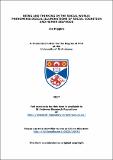Files in this item
Being and thinking in the social world : phenomenological illuminations of social cognition and human selfhood
Item metadata
| dc.contributor.advisor | Wheeler, Michael | |
| dc.contributor.author | Higgins, Joe | |
| dc.coverage.spatial | iv, 209 p. | en_US |
| dc.date.accessioned | 2017-04-21T15:02:01Z | |
| dc.date.available | 2017-04-21T15:02:01Z | |
| dc.date.issued | 2017-06-22 | |
| dc.identifier.uri | https://hdl.handle.net/10023/10640 | |
| dc.description.abstract | At least since the time of Aristotle, it has been widely accepted that “man is by nature a social animal”. We eat, sleep, talk, laugh, cry, love, fight and create in ways that integrally depend on others and the social norms that we collectively generate and maintain. Yet in spite of the widely accepted importance of human sociality in underlying our daily activities, its exact manifestation and function is consistently overlooked by many academic disciplines. Cognitive science, for example, regularly neglects the manner in which social interactions and interactively generated norms canalise and constitute our cognitive processes. Without the inescapable ubiquity of dynamic social norms, any given agent simply could not cognise as a human. In this thesis, I aim to use a range of insights – from phenomenology, social psychology, neuroscience, cultural anthropology and gender studies – to clarify the role of sociality for human life. More specifically, the thesis can be broadly separated into three parts. I begin (chapters 1 and 2) with a broad explanation of how human agents are fundamentally tied to worldly entities and other agents in a way that characterises their ontological existence. In chapters 3 and 4, I criticise two recent and much-discussed theories of social cognition – namely, we-mode cognition and participatory sense-making – for failing to make intelligible the social constitution of human existence. In the later chapters (5-7), I then propose foundations for a more satisfactory theory of social cognition, as well as explicating a view of human selfhood as ‘biosocial’, such that even the autonomy of biological bodies is socially codified from a human perspective. Taken together, the aforementioned chapters should contribute to calls for a new direction in social cognitive science, whilst also yielding novel insights into the nature of human selfhood. | en_US |
| dc.language.iso | en | en_US |
| dc.publisher | University of St Andrews | |
| dc.subject | Philosophy of cognitive science | en_US |
| dc.subject | Social cognition | en_US |
| dc.subject | Phenomenology | en_US |
| dc.subject | Human selfhood | en_US |
| dc.subject.lcc | BF311.H54 | |
| dc.subject.lcsh | Cognitive science--Philosophy | en |
| dc.subject.lcsh | Social perception | en |
| dc.subject.lcsh | Phenomenology | en |
| dc.subject.lcsh | Self | en |
| dc.title | Being and thinking in the social world : phenomenological illuminations of social cognition and human selfhood | en_US |
| dc.type | Thesis | en_US |
| dc.type.qualificationlevel | Doctoral | en_US |
| dc.type.qualificationname | PhD Doctor of Philosophy | en_US |
| dc.publisher.institution | The University of St Andrews | en_US |
| dc.publisher.department | University of St Andrews. School of Philosophical, Anthropological and Film Studies | en_US |
This item appears in the following Collection(s)
Items in the St Andrews Research Repository are protected by copyright, with all rights reserved, unless otherwise indicated.

